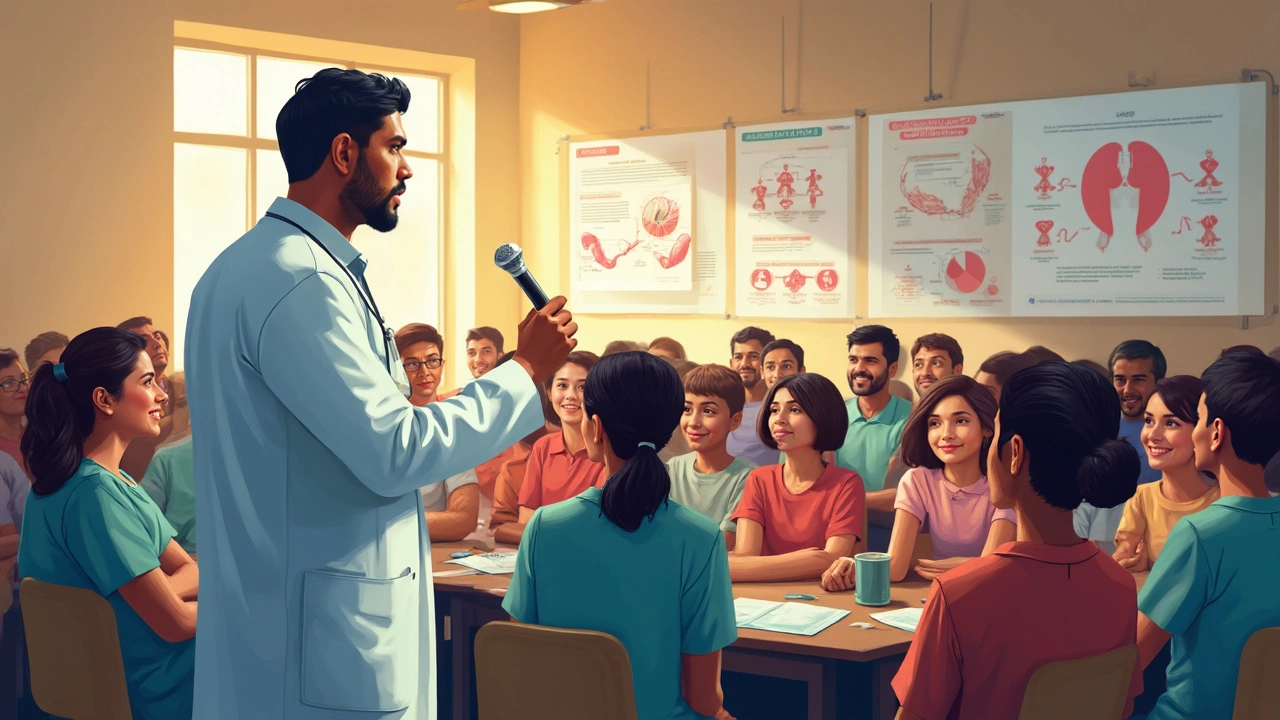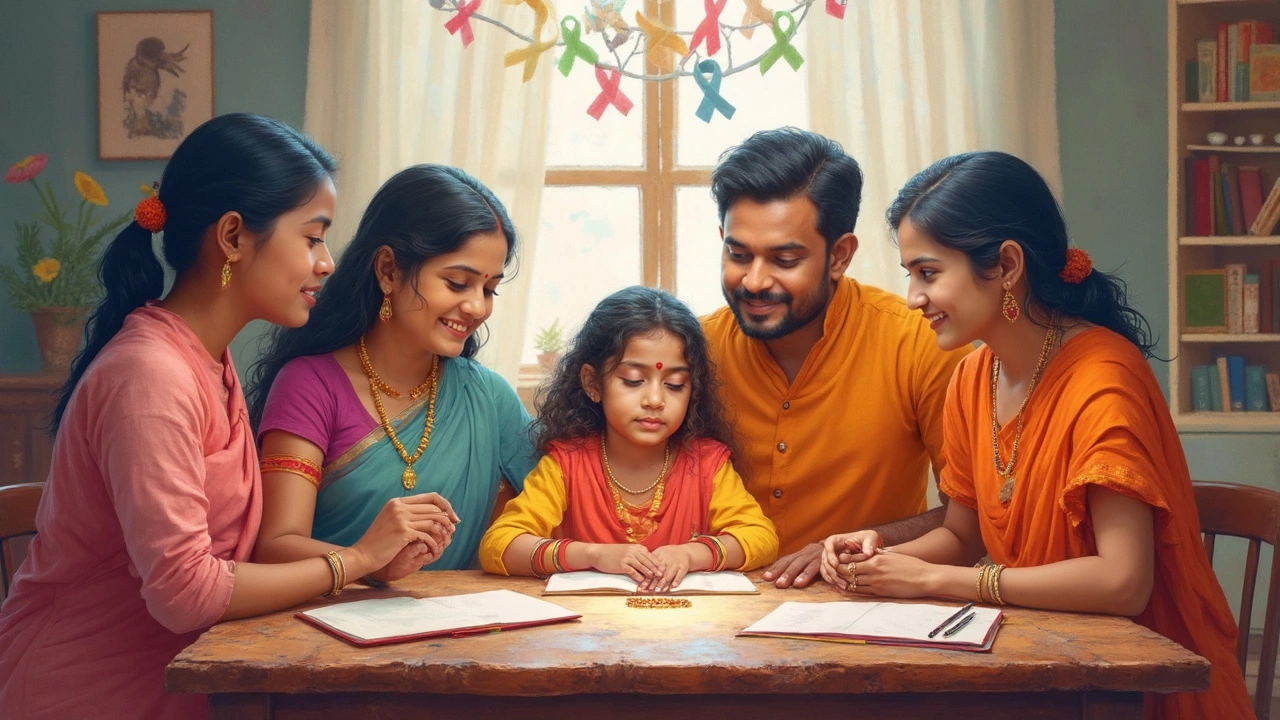When it comes to health, cancer is a word that nobody wants to hear. It's a tough opponent and understanding more about cancer can be really empowering. So, what are the deadliest cancers that we should be aware of?
Well, let's start with lung cancer, often dubbed the 'silent killer.' Why? Because it sneaks up without obvious symptoms until it's in advanced stages. Smoking is a major risk factor, but did you know non-smokers can get it too? That's why regular screenings are crucial, especially if you're in a high-risk group.
Next up, colorectal cancer. It's on the rise, which is worrying. A diet high in processed foods and red meat, combined with a sedentary lifestyle, can increase your risk. Feeling sluggish and experiencing unexplained weight loss? It might be time to get checked.
- Understanding Cancer: A Brief Overview
- Lung Cancer: The Silent Killer
- Colorectal Cancer: On the Rise
- Stomach Cancer: The Forgotten Threat
- Early Detection: Key to Fighting Cancer
- Advancements in Cancer Treatment
Understanding Cancer: A Brief Overview
Cancer is essentially a messed-up version of the body's normal cells. Instead of dying off as older cells do, these rogue cells keep growing uncontrollably, forming what we know as tumors. And not all tumors are the same. Some are benign, which are generally harmless, but others are malignant, and those are the ones you have to watch out for.
What Causes Cancer?
There isn't just one reason someone gets cancer. It's typically a mix of genetics and environmental factors. So, if your parents or grandparents had it, your odds might be higher, but lifestyle choices like smoking or too much sun exposure also play a huge role. Eating habits and activity levels? Yep, they matter too!
Common Symptoms to Watch For
One of the tricky things with cancer is that its symptoms vary widely. But there are some common things to watch out for:
- Unexpected weight loss
- Fatigue that doesn't go away
- Persistent pain or discomfort
- Changes in skin, like new moles or sores that don't heal
Statistics Worth Noting
Cancer isn't as rare as we'd like it to be. According to recent data, about 1 in 3 people will develop some form of cancer during their lifetime. It sounds scary, but remember, early detection can make a massive difference.
Being informed is the first step in fighting the top deadliest cancers. Knowing what to look for and understanding your risks can guide you in making healthier choices.
Lung Cancer: The Silent Killer
Lung cancer is one of those things many hope to avoid, but it's still the deadliest cancer out there. Affecting both smokers and non-smokers, this disease often goes unnoticed until it's reached a critical stage. It claims more lives annually than breast, colon, and prostate cancers combined.
So, why does it fly under the radar? Its symptoms can be stealthy and easily mistaken for other ailments. A persistent cough or chest pain could be shrugged off as a minor issue. But don't ignore it—early detection can be life-saving.
Risk Factors
While smoking is the biggest risk factor, you've got to watch out for secondhand smoke, exposure to radon, and certain occupational hazards like asbestos. Age also plays a role, with most cases showing up in folks over 65.
Early Signs to Watch For
- Chronic cough
- Shortness of breath
- Unexplained weight loss
- Fatigue
If you're experiencing any of these, it's smart to check in with your doctor. Regular screenings are a good idea, especially if you've got a history of smoking or other risk factors.
"Lung cancer's early detection is crucial. It can make a significant difference in treatment outcomes," says Dr. John Smith, a leading oncologist.
Prevention and Treatment
The best prevention is quitting smoking or staying away from it altogether. But the air we breathe matters too, so try to ensure good ventilation in your home and workplace. If diagnosed, the treatment usually involves surgery, chemotherapy, or radiation. Newer therapies like immunotherapy are showing promise in some cases.
Statistics to Know
| Year | Cases | Deaths |
|---|---|---|
| 2023 | 200,000 | 150,000 |
| 2024 | 198,000 | 147,000 |
Knowledge is half the battle when it comes to tackling lung cancer. Stay informed and proactive, and you'll have a fighting chance against this silent threat.
Colorectal Cancer: On the Rise
Did you know that colorectal cancer is getting more common nowadays? It's not just something older folks have to think about anymore; younger adults are seeing a spike in cases too. Scary, right? But understanding why it's happening can help us tackle it better.
Why the Increase?
The reasons behind this uptick are many. Our lifestyle choices play a big role. Eating lots of processed foods and red meat, skipping on fruits and veggies, and avoiding exercise are some things that increase risk. Our love for fast food might be delicious but it’s not doing us any favors.
Recognize the Symptoms
Spotting signs early can be lifesaving. Pay attention to unexplained weight loss, feeling tired all the time, or changes in bowel habits like blood in the stool or persistent diarrhea. Don’t ignore these signs and hope they go away. Get it checked!
Screening and Prevention
If you're above 45, doctors usually recommend regular screening for colorectal cancer. They’re not trying to be nosy, just safe. Catching it early can make treatment a lot easier and more successful. Colonoscopies might sound scary, but they’re a powerful tool in the fight against cancer.
Treatment Options
Getting a diagnosis isn’t the end of the road. We've got various treatments now like surgery, radiotherapy, and chemo. Your doctor will guide you through the best options based on your specific case.
Want to keep track of your risk? A table of lifestyle factors linked to colorectal cancer might help:
| Factor | Impact |
|---|---|
| Processed Foods | Increases risk |
| Red Meat | Increases risk |
| Physical Activity | Decreases risk |
| Smoking | Increases risk |
With awareness and a bit of lifestyle tweaking, we can take control and reduce our risks. So, why wait? Let’s spread the word and make these changes today!

Stomach Cancer: The Forgotten Threat
Stomach cancer often flies under the radar until it's too late, which is why it's often called the forgotten threat. It ranks as one of the deadliest cancers worldwide, causing significant mortality despite advances in treatment methods.
One of the main culprits behind stomach cancer is an infection by Helicobacter pylori, a type of bacteria that settles in the stomach lining. Long-term inflammation leads to changes in the stomach lining, potentially leading to cancer. If you've had a persistent stomach ache or ulcers, it could be related.
Who Is at Risk?
There's a higher risk for older adults, primarily those over 60. Your diet plays a crucial role, too. A diet filled with smoked or pickled foods and low in fruits and vegetables raises your risk significantly. Family history is another factor, so if any relatives had stomach cancer, it's wise to stay vigilant.
Recognizing Symptoms Early
Early detection is vital. Symptoms might include a feeling of bloating after eating, nausea, or stomach pain. Sometimes, there's a loss of appetite or unintended weight loss. If these symptoms persist, don’t ignore them.
Prevention Tips
- Maintain a healthy diet rich in fruits and veggies.
- Say no to smoking or at least try to cut down.
- Consider regular screening if you're at risk.
Monitoring your health and being proactive with check-ups are key steps in reducing the risk of stomach cancer. So keep these tips in mind, and for more awareness on these issues, talk to your healthcare provider today. Remember, the fight against cancer is all about awareness and early detection!
Early Detection: Key to Fighting Cancer
Catching cancer early can seriously boost your chances of beating it. The earlier some cancers are detected, the easier they are to treat, which can ultimately lead to better outcomes. So, just how do you get ahead in this game?
Regular Screenings Matter
First off, regular screenings are the MVPs of early detection. If you're over the age of 50, getting screened for colorectal cancer is crucial, especially with its rising rates. Similarly, smokers or those who live in polluted areas should consider regular lung cancer checks.
Screening isn't just about ticking a box. It's about spotting changes that you might not notice – like those lurking in your lungs or colon. Some cancers can develop without any initial symptoms, which is why sticking to a routine check-up schedule can catch these issues before they become serious.
Know the Warning Signs
Knowing potential warning signs is another part of early detection. For lung cancer, a persistent cough or unusual shortness of breath could be red flags. Meanwhile, bloody stools or persistent abdominal discomfort might signal colorectal cancer. Recognizing these clues early on means you can act quickly and get evaluated by a doctor.
Advanced Tools and Techniques
Today's technology is a game-changer in detecting cancer early. We're talking imaging tests, like CT scans and MRIs, and advanced screenings, like low-dose CT scans for lung cancer in high-risk participants. These tools help spot abnormalities well before they become a problem.
Personalized Monitoring
Tailoring your monitoring based on personal risk factors can also enhance early detection. Consider family history, lifestyle, and genetics when deciding on your screening plan with your healthcare provider. This personalized approach helps catch cancers that might have been missed with a one-size-fits-all strategy.
Put simply, the game of cancer survival starts with staying ahead. With the right mix of vigilance and modern technology, you can stack the odds in your favor.
Advancements in Cancer Treatment
There's been some serious headway in the battle against cancer thanks to new and improved treatment options. Scientists are pushing boundaries every day, and their discoveries are changing how we tackle cancer treatment.
One of the most exciting areas is the development of immunotherapy. This approach trains your immune system to recognize and destroy cancer cells. It's like giving your body's defense system a roadmap to track down invaders. While not perfect for all cases yet, many patients have seen significant improvements.
Precision Medicine: Tailoring Treatment
Ever heard of precision medicine? It's a game-changer. By understanding the unique genetic makeup of a person's cancer, doctors can tailor treatments specifically designed for that individual. This means better outcomes and fewer side effects. It's like having a suit custom-made for you rather than grabbing whatever's available off the rack.
Targeted Therapy: A Direct Hit
Another biggie is targeted therapy. This treatment zeros in on the specific molecules causing cancer cells to grow. Imagine a guided missile directed at only the cancer cells, leaving healthy cells alone. It's a far more strategic approach than traditional chemotherapy and has made a real difference for many types of cancers, including some deadliest cancers like lung cancer.
Then there's the use of artificial intelligence (AI) in treatment plans. AI helps predict how a cancer might behave, providing doctors with crucial information for creating successful strategies. It's like having a crystal ball but with loads of data behind it.
Let's not forget about advancements in surgery and radiation. Minimally invasive surgeries and improved radiation technologies mean less downtime and quicker recovery for patients. These advancements ensure that cancer treatment is not only about survival but maintaining a quality of life too.
The fight against cancer remains a priority, with ongoing research promising even better treatments in the coming years.
